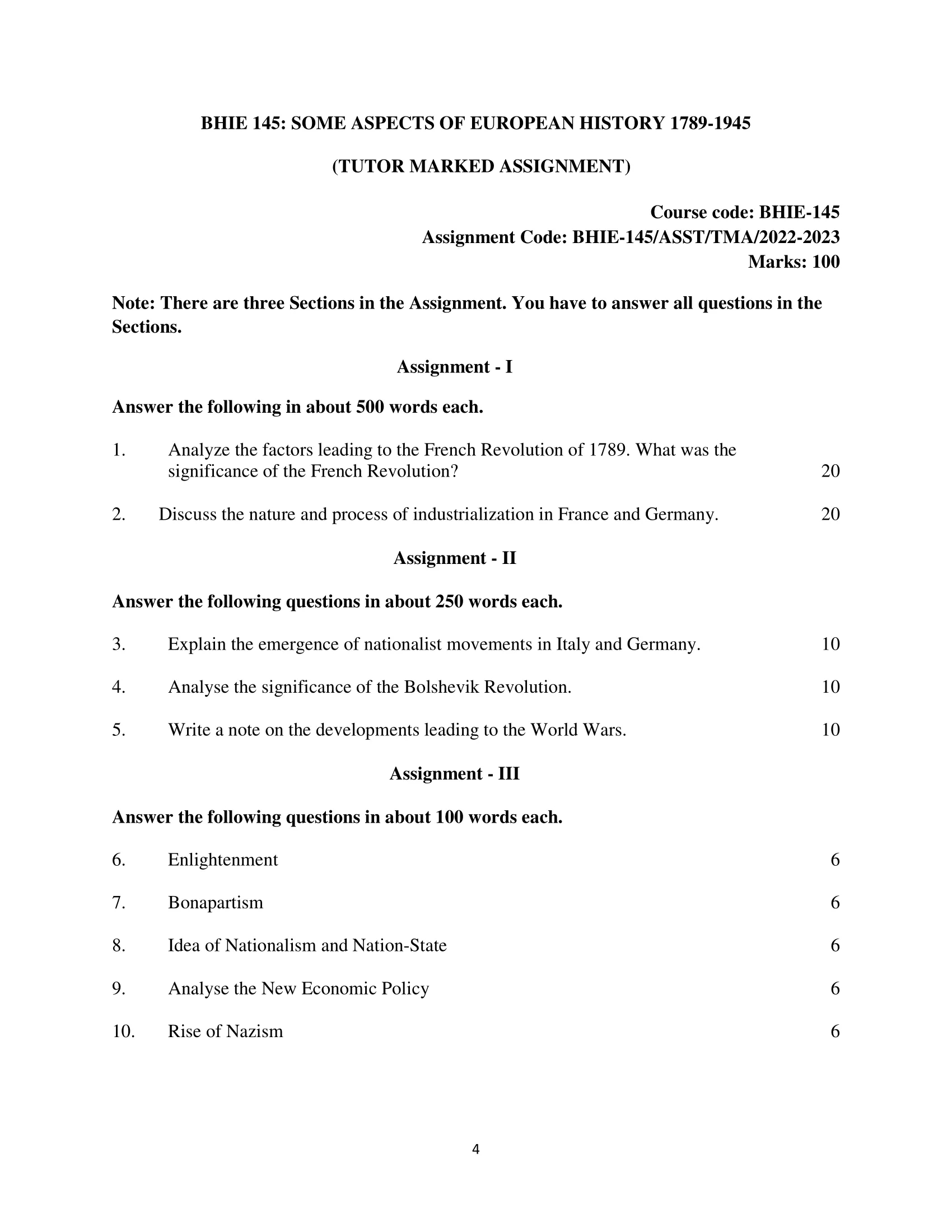Contents
- 1 Assignment – I
- 2 Answer the following in about 500 words each.
- 3 1. Analyze the factors leading to the French Revolution of 1789. What was the significance of the French Revolution?
- 4 2. Discuss the nature and process of industrialization in France and Germany.
- 5 Assignment – II
- 6 Answer the following questions in about 250 words each.
- 7 3. Explain the emergence of nationalist movements in Italy and Germany.
- 8 4. Analyse the significance of the Bolshevik Revolution.
- 9 5. Write a note on the developments leading to the World Wars.
- 10 Assignment – III
- 11 Answer the following questions in about 100 words each.
- 12 6. Enlightenment
- 13 7. Bonapartism
- 14 8. Idea of Nationalism and Nation-State
- 15 9. Analyse the New Economic Policy
- 16 10. Rise of Nazism

| Title | BHIE-145: IGNOU BAG Solved Assignment 2022-2023 |
| University | IGNOU |
| Degree | Bachelor Degree Programme |
| Course Code | BHIE-145 |
| Course Name | SOME ASPECTS OF EUROPEAN HISTORY 1789-1945 |
| Programme Name | Bachelor of Arts (General) |
| Programme Code | BAG |
| Total Marks | 100 |
| Year | 2022-2023 |
| Language | English |
| Assignment Code | BHIE-145/ASST/TMA/2022-2023 |
| Last Date for Submission of Assignment: | For June Examination: 31st April For December Examination: 30th September |

Assignment – I
Answer the following in about 500 words each.
1. Analyze the factors leading to the French Revolution of 1789. What was the significance of the French Revolution?
Ans: The French Revolution of 1789 was a turning point in French history and had far-reaching impacts on the world. The revolution was caused by a combination of factors, including financial crisis, political corruption, and Enlightenment ideas.
Financial crisis was one of the main factors that led to the French Revolution. The French government was heavily in debt due to wars, extravagant spending, and a shortage of tax revenue. The government attempted to raise money through new taxes, but this only led to widespread poverty and anger among the people. The French nobility and clergy, who were exempt from taxes, became the focus of public anger and resentment.
Political corruption was another factor that contributed to the French Revolution. The French government was dominated by the monarchy and the nobility, who had little regard for the common people. The government was ineffective and inefficient, and the king and queen were more concerned with their personal pleasure and wealth than with the well-being of the country. The French people became increasingly disillusioned with their leaders and the political system.
The Enlightenment was a intellectual movement that emphasized reason, liberty, and equality. Its ideas were widely discussed and debated in France, and they influenced the political and social changes that occurred during the revolution. The Enlightenment thinkers believed that people had certain inalienable rights, including the right to life, liberty, and property, and that government should be based on reason and justice. These ideas were a major influence on the leaders of the French Revolution and helped to shape the revolutionary movement.
The French Revolution had a significant impact on the world and set a precedent for future revolutionary movements. The French people overthrew the monarchy and established a democratic government, which was a radical departure from the traditional political systems of Europe. The revolution also inspired similar movements in other countries, including the Haitian Revolution and the Latin American Wars of Independence.
The French Revolution also marked a turning point in the history of Europe and the world. It led to the rise of nationalism, the spread of democratic ideals, and the development of modern political systems. The revolution also sparked a wave of violence and terror that lasted for several years, and the consequences of this violence are still felt today.
2. Discuss the nature and process of industrialization in France and Germany.
Ans: Industrialization was a major transformation in the economic, social, and political structures of France and Germany during the 19th and early 20th centuries. The process of industrialization involved the transition from an agrarian-based economy to one that was dominated by industrial production and urbanization. Both France and Germany underwent industrialization, but the nature and process of industrialization differed in each country.
In France, the process of industrialization was gradual and uneven. The French economy was dominated by small workshops and handicraft industries, and the transition to large-scale industrial production was slow. The government played a limited role in the process of industrialization, and the French economy was largely driven by private enterprise. Despite this, the French economy experienced significant growth during the 19th century, and France became one of the leading industrial powers in Europe.
In Germany, the process of industrialization was much more rapid and comprehensive. The German economy was characterized by a strong and efficient government, a well-developed banking system, and a highly educated population. The government played a more active role in the process of industrialization, investing in infrastructure and providing support to businesses. The German economy grew rapidly, and by the end of the 19th century, Germany had become one of the leading industrial powers in the world.
The nature of industrialization in France and Germany was also different. In France, the industrialization process was centered on the production of luxury goods and consumer goods. The French economy was dominated by small and medium-sized businesses, and the industrial sector was relatively decentralized. In contrast, the German industrialization process was focused on the production of heavy industries, such as steel and chemicals. The German economy was dominated by large corporations, and the industrial sector was highly centralized.
Another difference between the nature of industrialization in France and Germany was the impact on society. In France, the process of industrialization led to significant social and economic changes, including urbanization and the growth of the working class. The French working class was largely unorganized, and the government was slow to respond to their needs. In Germany, the process of industrialization led to greater social and economic stability, and the German working class was better organized and better protected. The German government was more responsive to the needs of the working class, and labor laws and regulations were put in place to protect their rights.
Assignment – II
Answer the following questions in about 250 words each.
3. Explain the emergence of nationalist movements in Italy and Germany.
Ans: Nationalist movements emerged in Italy and Germany during the late 19th and early 20th centuries as a result of a number of factors, including economic, social, and political changes. In Italy, the Risorgimento movement sought to unify the various states and regions of the country into a single, centralized nation-state. This was driven in part by a desire to challenge the dominance of foreign powers, particularly Austria, and to establish a strong and independent Italian identity. The movement was also fueled by a growing sense of nationalism among the Italian people, who sought to assert their cultural and political identity as a distinct and unified nation.
Similarly, the emergence of a nationalist movement in Germany was driven by a desire to unify the various states and territories of the country into a single, centralized nation-state. The movement was also motivated by a desire to challenge the dominance of other European powers, such as France and Britain, and to establish Germany as a major global power. The German nationalist movement was also fueled by a growing sense of cultural pride and national identity, as well as a desire to assert the unique qualities and strengths of the German people and their culture.
Both Italy and Germany saw the rise of charismatic leaders who played a key role in the development of these nationalist movements. In Italy, the figure of Giuseppe Garibaldi emerged as a leader of the Risorgimento movement, while in Germany, figures such as Bismarck and Wilhelm I were instrumental in the development of German nationalism. Through their leadership, these movements gained popular support and helped to shape the political and cultural identities of Italy and Germany as nation-states.
Overall, the emergence of nationalist movements in Italy and Germany was driven by a complex mix of economic, social, and political factors, and played a critical role in shaping the modern identity of these countries as unified, centralized nation-states.
4. Analyse the significance of the Bolshevik Revolution.
Ans: The Bolshevik Revolution, which took place in Russia in 1917, was one of the most significant events of the 20th century. Led by Vladimir Lenin and the Bolshevik Party, the revolution marked the end of the rule of the Romanov dynasty and the beginning of Soviet-style communism in Russia. The revolution had far-reaching effects not only in Russia but also around the world, shaping the course of international politics and the development of modern society.
One of the most significant outcomes of the Bolshevik Revolution was the establishment of the first communist state in the world. The revolutionary government, led by Lenin and later Joseph Stalin, implemented a series of radical policies aimed at transforming Russian society and the economy, including the collectivization of agriculture and the nationalization of industry. The Soviet Union, as the country was renamed, became a model for other communist movements around the world and a major player on the international stage.
The Bolshevik Revolution also had a profound impact on the development of modern political thought and the ideology of communism. Lenin and the Bolsheviks were among the first to put Marxist theory into practice, and their ideas and experiences influenced the development of communism as a political and economic system. The Soviet Union became a symbol of the triumph of the working class and a source of inspiration for left-wing movements around the world.
In addition to its impact on the development of communism, the Bolshevik Revolution also had a major impact on the development of modern international relations. The Soviet Union emerged as a major global power, challenging the dominance of the Western democracies and shaping the course of world events through the Cold War. The revolution also had a profound impact on the course of world history, leading to the eventual collapse of the Soviet Union and the end of the Cold War.
5. Write a note on the developments leading to the World Wars.
Ans: The development leading to the World Wars was a complex and multifaceted process that took place over several decades. A number of factors contributed to the outbreak of both World War I and World War II, including political, economic, and social changes, as well as the rise of nationalism and imperialism.
One of the key factors leading to the outbreak of World War I was the growing militarism and competition for power among the major European powers. The arms race between countries, the formation of military alliances, and the increasing tensions between nations set the stage for the conflict. The assassination of Archduke Franz Ferdinand of Austria-Hungary by a Serbian nationalist in 1914 was the immediate trigger that set off the war.
The aftermath of World War I also contributed to the development of World War II. The Treaty of Versailles, which ended the First World War, imposed harsh penalties on Germany and led to economic instability and political extremism. The rise of fascism in Italy, led by Benito Mussolini, and the National Socialist German Workers’ Party, led by Adolf Hitler, further destabilized the region and set the stage for another global conflict.
In addition to political and economic factors, the rise of nationalism and imperialism also played a role in the lead up to both World Wars. The belief in the superiority of one’s own nation and the desire to expand one’s territory and influence contributed to the tensions between countries. The pursuit of colonies and resources by imperial powers also created rivalries and conflicts that ultimately contributed to the outbreak of war.
Assignment – III
Answer the following questions in about 100 words each.
6. Enlightenment
Ans: The Enlightenment was an intellectual movement that took place in Europe during the 18th century. It was characterized by a focus on reason, science, and individualism. Enlightenment thinkers, including John Locke, Jean-Jacques Rousseau, and Immanuel Kant, believed in the power of reason and argued that knowledge could be gained through observation and experiment. They also believed in the importance of individual liberty, equality, and democracy, and their ideas influenced the political and social changes that occurred during the French Revolution. The Enlightenment was a major turning point in Western history and helped to lay the foundation for modern Western thought and values.
7. Bonapartism
Ans: Bonapartism refers to the political ideology and legacy of Napoleon Bonaparte, the French military leader and emperor. It is characterized by a strong central government, a powerful military, and a leader who holds near-absolute power. Bonapartism also emphasizes national unity and nationalism, as well as a focus on modernizing and industrializing the country. In the 19th and early 20th centuries, Bonapartist ideas and ideals influenced a number of European political movements, particularly those that sought to establish strong, centralized governments. The term “Bonapartism” is also sometimes used to refer to the successive governments in France that sought to revive and continue Napoleon’s legacy, often in an authoritarian manner.
8. Idea of Nationalism and Nation-State
Ans: The idea of nationalism refers to a political and cultural movement that emphasizes the shared cultural and historical identity of a specific group of people, typically defined by a common language, religion, or ethnicity. Nationalists believe that a nation should have its own sovereign state where its people can live and preserve their culture and traditions.
The nation-state is a modern political entity that emerged in Europe in the late 19th and early 20th centuries. It is a state in which the majority of citizens belong to a single nation and share a common culture and history. The nation-state is characterized by a centralized government and a sovereign authority over its territory and citizens. The idea of the nation-state became the dominant form of political organization in the world and was crucial in the development of modern nationalism.
Nationalism and the nation-state are intertwined, as nationalism often seeks to create or maintain a separate state for a particular nation. The creation of nation-states has led to the formation of modern political boundaries and the development of separate national identities, shaping the political and cultural landscape of the world today.
9. Analyse the New Economic Policy
Ans: The New Economic Policy (NEP) was an economic policy introduced in Soviet Russia in 1921, following the Russian Civil War. The NEP aimed to revive the country’s war-torn economy by combining elements of state control with elements of free-market capitalism. The government allowed private ownership of small businesses and allowed the buying and selling of goods and services, while maintaining control over large industries and key economic sectors. The NEP was successful in jumpstarting the Soviet economy, with an increase in agricultural and industrial production and improved living standards for the population. However, the policy was eventually abandoned in the late 1920s in favor of the more centralized and state-controlled system of planned economy. The NEP remains a significant episode in the history of Soviet economics and serves as an example of the challenges faced by socialist economies in the early 20th century.
10. Rise of Nazism
Ans: The rise of Nazism in Germany was a political phenomenon that took place in the 1920s and 1930s. The Nazi Party, led by Adolf Hitler, emerged as a powerful force in German politics and gained widespread support by capitalizing on the economic and political instability of the time. The Nazis promised to restore national pride and prosperity, and to rid Germany of the perceived threats posed by communists, Jews, and other minority groups. Hitler’s charismatic leadership, combined with the party’s aggressive propaganda and violence, helped the Nazis to seize power in 1933 and establish a dictatorship. The rise of Nazism led to the persecution of Jews and other minority groups, and set the stage for the atrocities of the Holocaust and the outbreak of World War II.
How to Download BHIE-145 Solved Assignment?
You can download it from the www.edukar.in, they have a big database for all the IGNOU solved assignments.
Is the BHIE-145 Solved Assignment Free?
Yes this is absolutely free to download the solved assignment from www.edukar.in
What is the last submission date for BHIE-145 Assignment?
For June Examination: 31st April, For December Examination: 30th October
















